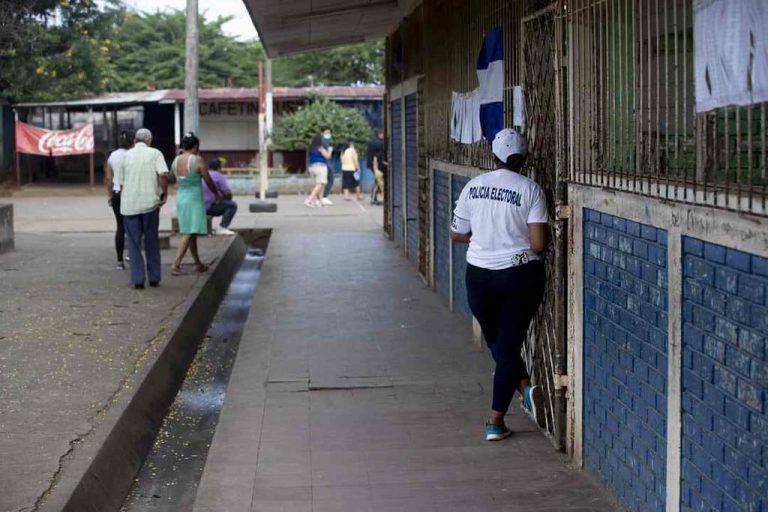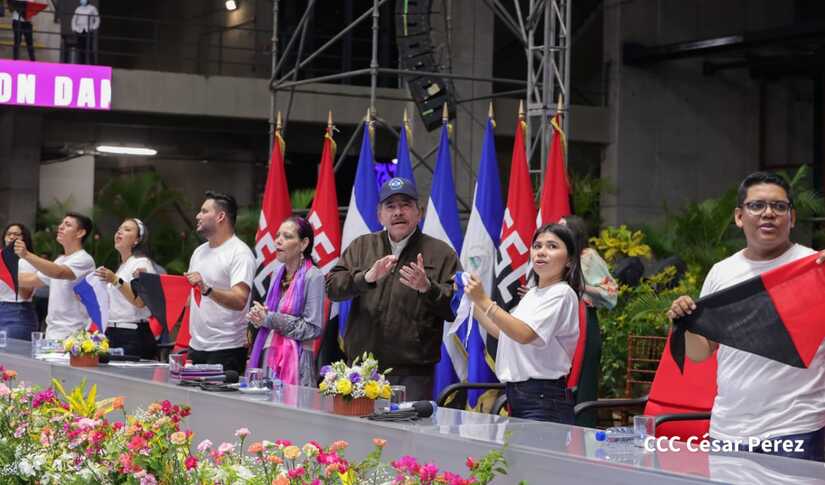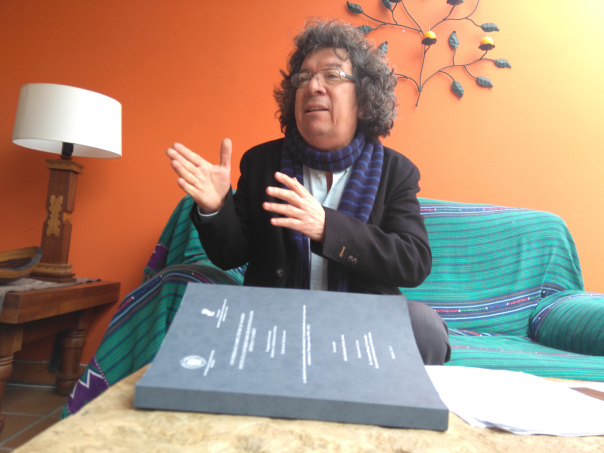16 de noviembre 2022

“NicaraguAmor” Cultural Caravan for Nicaraguans in the USA

PUBLICIDAD 1M
PUBLICIDAD 4D
PUBLICIDAD 5D
Political control of the 153 mayor’s offices in Nicaragua, one more step towards the establishment of a de facto one-party system

El control político de las 153 municipios y alcaldías en Nicaragua
The adjudication of Nicaragua's 153 mayor’s offices by the Sandinista Front (FSLN) put an end to the last remaining vestiges of "self-government" in the country and established a de facto single party system by eliminating any possibility that another party could govern in municipalities historically opposed to the regime of Daniel Ortega and Rosario Murillo.
"The regime, by taking over all the municipalities, decided to assume the costs of governing in all of the country’s municipalities. This is something that is both politically and demographically impossible, especially in this country. I do believe that this escalation represents a major step forward in what is, at the end of the day, a de facto reform of the State", explained Silvio Prado, specialist in municipal issues, in an interview on the program Esta Semana, which, because of the censorship by the Ortega-Murillo regime, will be broadcast on Facebook and YouTube on Sunday, November 13.
Ortega and Murillo consolidated their political power in Nicaragua with the November 6 municipal elections. These elections are considered a repeat of the 2021 electoral farce, in which the dictatorial couple assured themselves another term in power without political competition.
Prado points out that Ortega had options to "simulate" a multiparty system, but instead decided to impose himself in all municipalities, including the 12 municipalities that were not under his power, and where voters abstained from voting to make their dissatisfaction known. Prado considers this "a triumph of the population" because “with their abstention, they slammed the door in the regime’s face”.
Prado considers that the FSLN "has colonized the municipalities", in the sense that it will not actually govern, but rather carry out decisions made in Managua. The political control in all the municipalities of the country represents a "terrible" setback to decades ago by forcing the problems of the population "to pass through the strainer of the Sandinista party’s criteria".
This means that each person's problems "will have to pass the loyalty test of whether you vote for the Sandinistas or you don’t. If you’re not a Sandinista, your needs will be lower priority", said Prado.
In last Sunday's electoral farce, the FSLN won control over the 153 municipalities of the country. Does this represent a change in the power and political control model of Daniel Ortega and Rosario Murillo?
Yes, it is an incremental change, in the sense that the regime has kicked the ball forward once again, as it has been doing since 2018. Actually, this is more like flipping the table, as they say. The regime had several possibilities. It could have simulated electoral competition and pluralism, and it did not. It could have simulated the possibility of sharing local power with the other parties it has control over, the “parasite” parties. It could have simulated some expression of pluralism and allow the institutional presence of the opposition in local governments. The regime didn’t do any of these things and it didn’t do them because it didn’t want to.
The regime, by taking over all the municipalities of the country, which it could do, decided to assume the costs of governing in all the municipalities. This is something that is politically and demographically impossible, especially in this country. I do believe that this escalation represents a big step forward in what is, at the end of the day, a de facto reform of the State.
The State of Nicaragua was under a decentralization policy approved by former President Enrique Bolaños. It was a State that had adopted a modern format of multilevel governments, where there was the national level, the level of the autonomous governments of the Caribbean Coast, and the governments of the municipalities. Well, all of that was blown away with the stroke of a pen. The consequences are much more profound than what we’ve seen so far.
What does the total political control of the Sandinista Front mean for the life of citizens in the municipalities?
It means that your problems, those of your neighborhood or of your district are going to have to pass through the strainer of the Sandinista party’s criteria. Each person is going to have to pass the loyalty test of whether you vote for the Sandinistas or you don’t. If you’re not a Sandinista, your needs will be lower priority.
It is a terrible setback to many years ago, to the eighties and even worse, to before the eighties, when you had to wear a “Magnífica” [in between] to show that you were a member of the Liberal Party, so that your demands, your needs, would be worth something.

Daniel Ortega celebrated his victory in the "electoral farce" of November 6, 2022 during the conclusion of a Sandinista Youth Congress. Photo: Confidencial | Taken from 19 Digital.
How can the Sandinista Front govern a municipality in which it represents a minority? The vast majority of the population did not vote, apart from the fact that there should have been other political options. Are these municipalities where the FSLN is a minority now “occupied territories”?
More than occupied territories, they are colonies of the Sandinista Front. The Sandinista party has colonized the municipalities. It is not going to govern the municipalities; it is going to locally carry out the decisions made in Managua. They can’t govern, they can only carry out what they are told to do, what is prescribed, knowing they’re doing it against the sentiments and demands of the population. For example, I think of the folks where I worked for a long time, in the area of Boaco, Chontales, where they are not Sandinistas. So it's knowing that you’ll be managing everything with your back to the population, a population that doesn’t like you, that can’t stand you because you’re a Sandinista. You’re not going to govern, you’re going to carry out decisions that are made elsewhere.
There were 12 municipal governments that were not yet controlled by the Sandinista Front since 2017, aside from the ones that the police assaulted and took over. In the ones that were administered by the CxL, the Sandinista Front won with a proportion of the votes that was 30% below the vote count in 2017. It would seem that only Sandinistas voted.
Exactly. These results did not depend on the central government, nor on the Sandinista Front. I believe we need to applaud the populations of these municipalities. They stayed at home, they abstained. I read their abstention in these municipalities as a triumph of the population, because with their abstention they slammed the door in the regime’s face.
In the coming days we need to do a more detailed reading of this civic attitude of the population, of how they emptied out the regime, closed the doors on it with their abstention. I think it’s a civics lesson, and a lesson about the population’s aspirations, because it’s the population that wants self-government. We need to emphasize that aspect. With these elections, the last little spaces of self-government in the country have been shut down. It’s over. There are no more public servants who are going to be able to think for themselves and make their own decisions when they carry out their public responsibilities.
The collaborationist parties -- PLC, ALN, PLI and others-- obtained 26% of the valid votes but were not assigned any mayor’s offices, although they will be reimbursed 120 million córdobas. Are these parties no longer functional, no longer relevant to the FSLN's strategy of pretending there is a multiparty system? Can it be said that Nicaragua now has a single party regime?
There are several things implicit in this. First of all, the shame of the parasite parties that the regime didn’t let them win in even one municipality, not even the smallest one. I was of the opinion that they were going to give them a small piece of candy, at least a tiny municipality. It is shameful for the parasite parties that they have not even been allowed to do that. The main function of being a party, which is to dispute power, to dispute the Government in the municipalities, has been lost. I believe we are under a single party, not formally, but de facto, because they have eliminated any possibility for any other party to govern where the FSLN doesn’t have a majority.

Silvio Prado, PhD in Political Science and municipal expert. Photo: M. Largaespada | 1001 Trópicos
Daniel Ortega justified this imposition of a unanimous vote for the Sandinista Front by saying: This is how it had to be, there is no other alternative, the people only have the alternative of voting for the FSLN. Is he now clearly saying this is a single party system?
Exactly. What Ortega said is what he has always thought, that for the power of the revolution to be exercised there must be only one party. That is the outdated Leninist concept of a single and centralized party. What he said, for me, is a display of brutal cynicism, because he said they have voted for the only option because there are no other options. I believe that what the dictator's words reveal is a desire for the country to have no other party than the Sandinista Front, but he is assuming that he is going to pay some political costs for that, because it’s not so easy to govern with a single party. Cuba, North Korea and other countries where there is a single party can attest to that. In Nicaragua this is possible, but only under a dictatorship that cancels all civil and political liberties.
In these municipal elections, there were even more people detained by the police than during the electoral farce of November 2021. What is the FSLN afraid of if it has total control, control of all public spaces and all municipalities?
They are afraid of uncertainty, they are afraid of cases like in Camoapa, five years ago, where they were brutally defeated. They are afraid of not controlling all the possible variables implicit in an election. That’s what they are afraid of.
Dictatorial regimes are hostages to uncertainty, of not being able to know what is happening with the people, what people think, if they are going to turn out, if they are not going to turn out, how they are going to vote. They are afraid of the uncertainty that democrats take for granted, something that is totally normal. That is why they have continued to throw all these people in jail.
What alternatives are left given the police state, the hardening of the repression that exists today, at this moment, against political prisoners, against their families, against the persecuted?
To resist, to resist in all areas, as the population of the country is doing. To resist and nurture hope, and to document everything that is happening. I don't know if you have seen the film Argentina, 1985. You can see the importance of documenting everything that is happening. Right now, documenting --keeping a record of everything that is happening-- is a form of resistance because memory, at the end of the day, is a force of resistance against the oblivion that the dictatorship is trying to impose.
This article was originally published in Spanish in Confidencial and translated by our staff.
PUBLICIDAD 3M
Periodista nicaragüense, exiliado en Costa Rica. Fundador y director de Confidencial y Esta Semana. Miembro del Consejo Rector de la Fundación Gabo. Ha sido Knight Fellow en la Universidad de Stanford (1997-1998) y profesor visitante en la Maestría de Periodismo de la Universidad de Berkeley, California (1998-1999). En mayo 2009, obtuvo el Premio a la Libertad de Expresión en Iberoamérica, de Casa América Cataluña (España). En octubre de 2010 recibió el Premio Maria Moors Cabot de la Escuela de Periodismo de la Universidad de Columbia en Nueva York. En 2021 obtuvo el Premio Ortega y Gasset por su trayectoria periodística.
PUBLICIDAD 3D